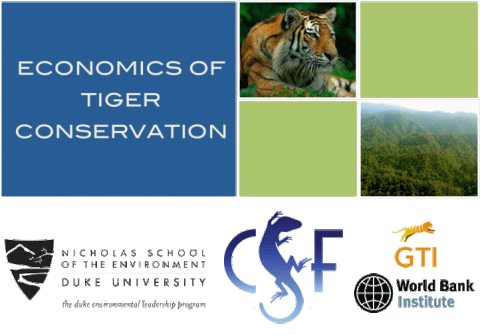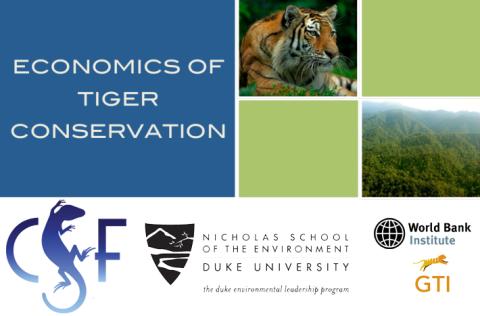
Conservation Strategy Fund and the Duke Environmental Leadership (DEL) Program were pleased to announce the course Economics of Tiger Conservation in partnership with the World Bank Institute and the Global Tiger Initiative. This one-week course helped environmental professionals working on tiger conservation issues gain knowledge and technical skills for conducting applied economic research in support of endangered species protection. Dates: November 15-19, 2010 Location: Duke University, North Carolina, USA Course This training addressed the economics of tiger conservation within a broader overview of economic concepts and tools as applied to biodiversity conservation. Participants gained an overview of economic causes of biodiversity loss, the economics of the tiger trade, environmental valuation of endangered species and their habitats, economic analysis methods, and economic instruments for conservation. These modules included examples and case studies related to tigers and other endangered species. As part of the application process, participants also prepared proposals for policy relevant research projects. After the course, participants had an opportunity to apply for follow-up funding for technical support and field costs. Participants The course was designed for analysts, researchers, academics and graduate students from academic institutions, government agencies, and NGOs in tiger-range countries who were interested in doing economic analysis and who were involved in biodiversity and unique species initiatives. It was required that applicants possess a background in economics and be proficient in English. Non-researcher applicants were considered if they were taking the course along with another person from their institution who did fit the above criteria. Location The course was held on the Duke University campus in Durham, North Carolina. The beautiful 9,000-acre campus is surrounded by woodlands and provides numerous opportunities for outdoor recreation. All course activities took place at Duke; field trips took place in the surrounding area. Course Program Economic principles Economic causes of biodiversity loss, externalities, institutional and policy issues, economics of tiger trade, incentives for conservation Environmental economics Valuation theory and methods, values of biologically diverse ecosystems, values of tiger habitat, values of unique species, indirect use values including PES, REDD and opportunity costs of conservation Data gathering and analysis Economic surveys such as travel cost and contingent valuation, survey design, field testing, basic analysis techniques Benefit-cost analysis Methods of benefit-cost analysis, steps of analysis, incorporating environmental externalities, discount rates, sensitivity and risk analysis, case study exercise Applied economic research Principles of program evaluation, presentation of research proposals by participants, feedback from panel of instructors 2010 Participants: Ajay Kumar Saxena, Project Coordinator, India United Nations Development Program (UNDP) Alamgir Gandapur, Project Director, Pakistan Khyber Pakhtunkhwa Forest Department Archi Rastogi, PhD Candidate, India McGill University Babu Ram Lamichhane, Conservation Officer, Nepal National Trust for Nature Conservation Bustanul Arifin, Professor of Agricultural Economics, Indonesia Department of Agricultural Economics and Social Sciences, University of Lampung Chandrakumara Duwa Pathirage, Senior Lecturer, Sri Lanka University of Sri Jayewardenepura Chunhui Ye, Associate Professor, China Center for Agricultural and Rural Development, Zhejiang University Dawa Zangpo, Forestry Officer, Bhutan Zhemgang Forest Division, Dept. of Forests and Park Services, Ministry of Agriculture and Forests Fabio Stefani, Development Director, Belgium Procter & Gamble Brand & Business Ismariah Ahmad, Senior Research Officer, Malaysia Forest Research Institute Malaysia Kamal Jung Kunwar, Environment Officer, Nepal Soil & Forest Conservation Ministry Assistant Klairoong Poonpon, Senior Forestry Training Officer, Thailand Wildlife Conservation Bureau, Department of National Parks, Wildlife and Plant Conservation Luthfi Fatah Arsyad, Professor of Resource Economics, Indonesia Lambung Mangkurat University Milind Pariwakam, Officer in Charge, Tiger Conservation Projects, India Wildlife Trust of India Pavithra Kulatunga, Management and Financial Assistant, Research Coordinator, Sri Lanka Department of Wildlife Conservation (DWC) Philayvanh Viravouth, Administration Technician, Lao PDR Water Resources and Environment Ruchi Badola, Scientist F (Professor), India Wildlife Institute of India Sanjay Gubbi, Program Assistant Director, Conservation Science and Policy, India Wildlife Conservation Society – India Saowalak Roongtawanreongsri, University Lecturer, Thailand Environmental Economic Research Unit, Faculty of Environmental Mgmt, Prince of Songkla Saudamini Das, Associate Professor, India SSN College, University of Delhi Sunarto, Graduate Research Assistant and PhD Candidate at Virginia Tech, USA/Indonesia Virginia Tech & World Wildlife Fund Victoria Molchanova, Projects Coordinator, Russia Phoenix Fund Conservation Vuong Tien Manh, Directorate of Vietnam Scientific and International Cooperation on Wildlife, Vietnam Forestry Instructors and Facilitators Course instructors are experts in environmental economics who also have extensive field experience and understand real-world conservation challenges. They were drawn from Duke University and the World Bank Institute as well as several other leading academic and international institutions. A sampling of course facilitators and instructors: Kim Bonine Training Director, Conservation Strategy Fund Ms. Bonine joined Conservation Strategy Fund in 2001 and has led training courses and analysis projects in Africa, Asia and North and South America on themes such as capacity building for conservation, contributions of protected areas to national economies, economic values of the environment, tourism economics, invasive species, natural resource management, and cost-benefit analysis techniques. For the past ten years she has been running CSF’s International Economic Tools for Conservation Course in partnership with Stanford University. Prior to joining CSF, Ms. Bonine worked at Stanford’s Center for Environmental Science and Policy analyzing population and environment linkages in Micronesia and the resilience of human-environment systems. While at Stanford she also researched impacts of forest habitat fragmentation in Mexico, and worked on community development strategies for poverty alleviation with the World Bank in Zimbabwe. Her work has appeared in Ambio, Conservation Biology and Pacific Science. Ms. Bonine holds a Master’s in Earth Systems and a Bachelor’s in Human Biology, both from Stanford University. Jeff Vincent Professor, Nicholas School of the Environment and Sanford School of Public Policy, Duke University Dr. Vincent is Clarence F. Korstian Professor of Forest Economics and Management at Duke University. His research focuses on the economics of natural resource management and policy in developing countries. Currently, his two main projects are a 5-year, GEF-funded project with the Forest Research Institute Malaysia on biodiversity conservation in tropical landscapes affected by commercial logging, and an ongoing series of studies with the U.N. Food and Agriculture Organization (FAO) and the International Rice Research Institute (IRRI) on the agricultural impacts of climate change in Asia. He has also worked extensively with the World Bank on environmental adjustments to national income and wealth accounts ("green accounting"). His articles have appeared in environmental economics journals, economic development journals, forestry journals, and general science journals. Professor Vincent serves on the board of the Beijer Institute of Ecological Economics in Stockholm, Sweden, and the international advisory committees of the South Asian Network of Development and Environmental Economists (SANDEE) and the Center for Environmental Economics and Policy in Africa (CEEPA). He has degrees from Yale University (Ph.D., 1988), Michigan State University (M.S., 1984), and Harvard University (A.B., 1981). Pablo Benitez Ph.D., World Bank Institute Dr. Benitez is a Senior Environmental Economist working with the Climate Change Practice of the World Bank Institute. He currently leads various knowledge management activities and training program on REDD, Climate Finance and Low Carbon Development, focusing on Latin America, Africa and Asia. Prior to joining the Bank, he was Chief Economist of Marbek Resource Consultants Ltd. where he led a variety of environmental economic analysis projects for government and private sector clients. Previously, he worked as an economist for the Ministry of Environment of British Columbia, the International Institute for Applied System Analysis (IIASA) in Austria, the Energy Research Centre of the Netherlands and the German Agency for Technical Cooperation in Ecuador. Dr. Benitez holds a PhD degree from Wageningen University (The Netherlands) in Environmental Economics. He has an extensive list of peer-reviewed publications on climate change and environmental economics and was a lead author of the IPCC Fourth Assessment Report, work that was awarded the Nobel Peace Prize. Dr. Benitez has also been a Senior Lecturer of Natural Resource Economics at the University of Victoria and at Carleton University. About Conservation Strategy Fund Over the last decade, Conservation Strategy Fund (CSF) has conducted applied economics training for conservation professionals from around the world. Over the past decade, CSF has trained over 1000 people from 75 countries around the world, and conducted over 40 courses across North America, South America, Africa and Asia. CSF takes its training from the classroom into the field, and has completed dozens of high-impact policy or economic analyses in the Americas and Africa. These studies, often in partnership with course graduates, have influenced policies in support of conservation and have helped conserve millions of acres of natural habitat. For a short video on our International Training Course and to meet some of our 2009 students, click here. About the Duke Environmental Leadership Program The Duke Environmental Leadership (DEL) Program improves the knowledge and understanding of environmental issues and leadership capacity among practicing environmental professionals, business executives, graduate students and K-12 teachers and students. The DEL Program is driven by interdisciplinary and global themes, strategic approaches to environmental management, communication and effective leadership. DEL is housed at Duke University’s Nicholas School of the Environment, and is comprised of an online Master’s degree program, executive education courses, and community outreach programs. About the World Bank Institute The World Bank Institute (WBI) is a global facilitator of capacity development. It connects practitioners and networks from around the world for knowledge exchange and learning. WBI’s Climate Change Practice (WBICC) focuses on three key components: (i) Cities and Climate Change; (ii) Innovation in Carbon Finance; and (iii) Climate Adaptation for Water, Agriculture and Natural Resource Management. WBICC integrates and package the best available knowledge on climate change mitigation and adaptation from inside and outside the World Bank. Using structured learning, south-south knowledge exchange, networks and innovation platforms it shares knowledge and learning with constituencies from around the world. About the Global Tiger Initiative The Global Tiger Initiative was launched by President Robert B. Zoellick of the World Bank, the Smithsonian Institution, GEF, and an alliance of governments and international organizations in June 2008. The GTI envisions a reversal in trends for the wild tiger, helping it to recover and repopulate its habitats in sustainable numbers. Today’s challenge is to fulfill the growing development needs of people and to manage natural resources, of which the tiger is one, in a sustainable way. In other words, a new development paradigm.


